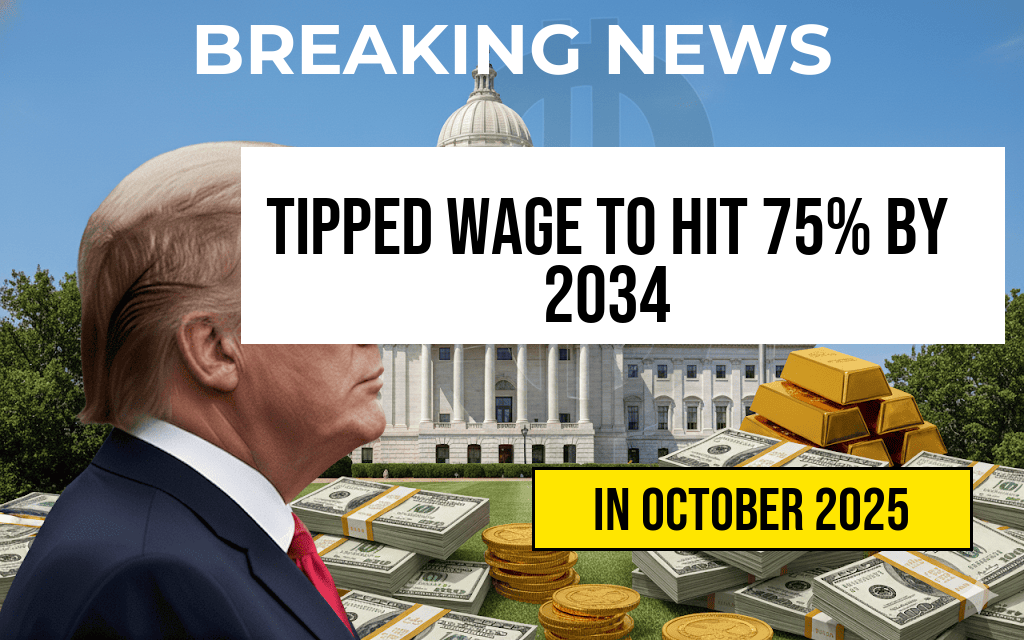The tipped wage is projected to reach 75% of the federal minimum wage by 2034, according to new research from the Economic Policy Institute (EPI). This increase has raised concerns among workers in the service industry who claim that they are losing out on hundreds of dollars each week due to mismanagement and lack of enforcement of tipping regulations. As states and localities grapple with how to address this issue, many workers are advocating for greater transparency and accountability in the way tips are reported and distributed. This article explores the implications of the projected wage increase and highlights the voices of individuals who believe their earned income is being overlooked.
The Current Landscape of Tipped Wages
Tipped workers, primarily in the restaurant and hospitality sectors, often rely heavily on gratuities to supplement their base wages. Currently, the federal minimum wage stands at $7.25 per hour, with the tipped minimum wage set at $2.13 for employers who meet certain conditions. This disparity has long been a point of contention, as many workers claim that their actual earnings often fall short of what they should receive.
Projected Growth of Tipped Wages
The EPI report indicates that the tipped wage is expected to rise significantly over the next decade. By 2034, it is projected to reach 75% of the federal minimum wage, effectively increasing the baseline income for tipped workers. However, this growth raises questions about how tips will be managed and whether workers will see a fair share of the revenue they generate.
Worker Experiences and Concerns
- Underreported Tips: Many workers report that their tips are not accurately recorded, leading to discrepancies in their reported income. This situation is compounded by the lack of oversight in many establishments.
- Inconsistent Practices: Different employers have varying practices regarding how tips are pooled or distributed, leaving some workers feeling shortchanged.
- Fear of Retaliation: Workers often hesitate to report issues regarding tip mismanagement for fear of losing their jobs or facing backlash from management.
The Legislative Response
In response to these concerns, some states have begun implementing stricter regulations on tipped wages and reporting. For example, California and Washington have moved towards eliminating the tipped wage entirely, ensuring that workers receive the full state minimum wage before tips. These legislative changes aim to protect workers and provide them with a more stable income.
Advocacy for Change
Worker advocacy groups are pushing for reforms that prioritize transparency and fairness in the tipping system. They argue that without proper regulations, many workers are left vulnerable to exploitation. “We’re not just asking for a raise; we want to ensure that what we earn reflects our hard work,” said Maria Torres, a server at a local restaurant. “Hundreds of dollars are being overlooked every week, and it’s time for that to change.”
Challenges Ahead
Despite the positive trends in wage projections, challenges persist. Many employers argue that increasing the tipped wage could lead to higher prices for consumers and potentially reduce the number of jobs available in the service sector. This ongoing debate highlights the complexities involved in balancing worker rights with economic realities.
Potential Solutions
Experts suggest several potential solutions to improve the situation for tipped workers:
- Enhanced Training: Providing training for employers on proper tip reporting and distribution practices could help mitigate discrepancies.
- Technology Integration: Utilizing point-of-sale systems that track tips more accurately could lead to better accountability.
- Worker Education: Educating workers about their rights and the importance of reporting tip discrepancies is crucial for empowering them to advocate for themselves.
Conclusion
The projected increase of the tipped wage to 75% by 2034 represents a significant shift in the landscape for service industry workers. While this change offers hope for improved earnings, the ongoing challenges related to tip management and worker rights must be addressed. As advocacy efforts continue, the voices of workers will play a crucial role in shaping a fair and equitable tipping system.
For more information, visit the Economic Policy Institute and Forbes for insights into the implications of these changes.
Frequently Asked Questions
What is the current tipped wage and how is it projected to change by 2034?
The current tipped wage varies by state, but it is projected to reach 75% of the standard minimum wage by 2034, significantly impacting the income of workers in the service industry.
How are workers being affected by the current tipped wage system?
Many workers claim that they are losing out on hundreds of dollars weekly due to the way tips are reported and distributed, leading to financial instability.
What steps are being taken to address the issues with tipped wages?
Various advocacy groups are pushing for reforms to ensure that tipped workers receive fair compensation and that their tips are accounted for properly, aiming to eliminate the discrepancies in earnings.
Why do some workers believe their tips are being overlooked?
Workers often feel that their tips are not fully recognized in their wages due to factors like tip pooling, lack of transparency, and inconsistent reporting practices.
What can consumers do to support tipped workers?
Consumers can help by being aware of the tipped wage issues and ensuring they tip appropriately, as well as advocating for fair labor practices in their communities to support tipped workers.











